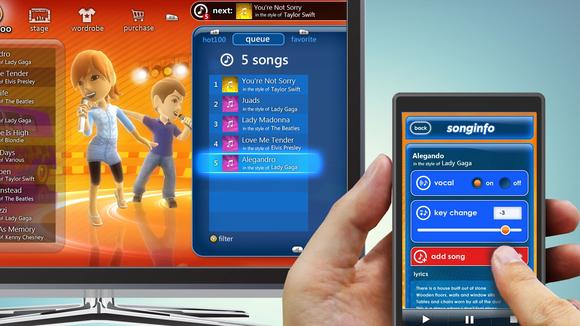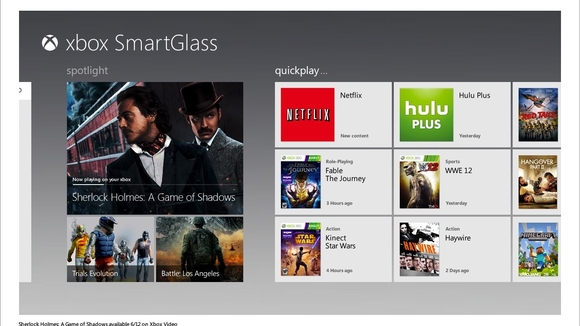admin
No description.Please update your profile.
Analysis Why SmartGlass is Microsoft’s killer app
The launch of Microsoft’s new Windows 8 operating system was an unprecedented moment for the industry giant.
It is, after all, the first major version of Windows to be built from the ground up with smartphones and tablets in mind rather than being PC-centric.
What’s more, it was accompanied by the launch of Microsoft’s new Surface tablet, marking a historic new appetite within Redmond to take the fight to Apple on the hardware front.
It also coincided with the quiet release of Microsoft’s SmartGlass app. Inevitably the bulk of the media attention has been focused on Windows 8 and its flagship hardware, but SmartGlass is equally as important to the company’s plans. This is Microsoft’s killer app, and it could be pivotal.
Back in 1980, Bill Gates stated that Microsoft’s ultimate goal was “a computer on every desk and in every home”. At the time this was considered rather farfetched, but three decades on it almost seems conservative.

Having long since achieved this original ambition, Microsoft started looking for ways to expand its presence in our lives.
Enter, Xbox
There’s little doubt that the launch of the original Xbox console back in 2001 was part of a long term strategy to gain a foothold in the living room and help Microsoft become an arbiter of our digital leisure time in the same way it had become an ubiquitous part of our working lives.
Of course, Microsoft denied this at the time as it sought to gain credibility with the gaming press and establish itself in the market as a pure games company. However, once it launched the Xbox 360 and began to overturn the dominance of the PlayStation brand, the façade started to slip and more and more media services were added to Xbox Live.
Today Microsoft earns more revenue from TV, movies and music on the Xbox 360 than it does from games and there is no longer any ambiguity about the company’s intentions. Microsoft wants to own the living room.
However, as this strategy has been unfolding, the ground has been shifting beneath Microsoft’s feet. A resurgent Apple charted a different course for digital entertainment with the iPod, iPhone and iPad and in the process opened up a whole new world of computing on the go to ensure we are connected to our media everywhere and always.
Microsoft knows it is lagging behind in the new world of smartphones and tablets, and it’s banking on SmartGlass to help it catch up, and ultimately, to lead in the battle for the living room.
The Xbox advantage
The Xbox brand is a key advantage in Microsoft’s arsenal. There are 70 million Xbox 360s sitting under televisions across the world, most of which are connected to Xbox Live and able to stream on-demand television, movies, music and of course games to their owners TV screens.
With SmartGlass that same content can now be seamlessly served out to existing tablets and smartphones, including iOS devices. SmartGlass also augments television media with second-screen functionality such as displaying information about the cast in a movie you are watching or allowing you to bet on live sports, but only if you are watching them through your Xbox.
Shortly before the launch of Windows 8 and Surface, Microsoft highlighted the evolution of Xbox from a device to an entertainment service, with Yusuf Mehdi, chief marketing officer for Microsoft’s Interactive Entertainment Division confidently stating that “Xbox will be a gateway to the best in movies, TV shows, music, sports, your favourite games and instant access to your friends, wherever you are”.

SmartGlass is a key component in this evolution, because it’s through SmartGlass that the Xbox is able to become the “gateway” to your media that Mehdi is describing.
Microsoft knows that most of us own iOS or Android powered tablets and phones, but SmartGlass allows its Xbox entertainment ecosystem to bleed out onto these devices.
Microsoft doesn’t mind if you’re watching movies on your new iPad as long as they were purchased through Xbox. In addition, it’s betting that the more deeply you are drawn into Xbox entertainment services presented through a Windows 8 interface on your TV, the more likely you are to embrace Windows 8 powered tablets and phones with your next upgrade.
However, there are still some kinks to iron out. The aging Xbox 360 hardware isn’t quite the ideal central hub for all your entertainment needs. It’s not practical (or economical) to leave the device running, which creates an instant barrier between you and your media, and it wasn’t designed to multitask in the way that modern users expect.
Conveniently, hardcore gamers are also hungry for an upgrade, as the performance of games on the system has now fallen far behind that available on a modern PC.
Xbox 720
So, in 2013 Microsoft will launch a next generation Xbox console which supports an always-on power state and carries a chipset designed to enable concurrent apps.
The company knows that hardcore gamers will drive early adoption, but mass market penetration must follow quickly if its strategy is to succeed. In order to achieve this, Microsoft will begin to position itself more as a service provider like Sky than as a traditional console manufacturer.
Indeed, Microsoft has already been trialing this model with Xbox 360, which you can now purchase through selected retailers in the US for just $99 if you also sign up to a two-year Xbox Live subscription. This move is clearly in anticipation of a full transition to service provider when the new Xbox launches.
Bill Gate’s was serious about his company’s lofty goal back in 1980, and today Microsoft is serious about its new ambition to own the living room and become the de facto provider of our digital entertainment.
To achieve this objective, the Redmond giant is attacking on all fronts. Surface and its successors will answer the demand for sleek, innovative hardware that Apple has created in the market place, Windows 8 is ready to run on the full array of devices we now have in our lives, and Xbox will serve up all the entertainment and content we need via a seamless, SmartGlass-powered medium.
But is this strategy too convoluted? If one piece of the puzzle fails to fall into place, will the whole house of cards come tumbling down? This is the beginning of a fascinating new era in the history of Microsoft.
No description.Please update your profile.
You must be logged in to post a comment
@ 2016 Certkingdom.com-Developed By Certkingdom.com